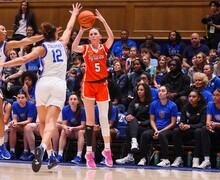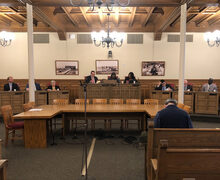‘Bohemian Rhapsody’ could’ve been a celebration of Queen. It isn’t.
“Bohemian Rhapsody” is one of Queen’s most important singles, so it seems fitting that the song was chosen to be the title of the new “Bohemian Rhapsody” film. The song, though, is never played fully once during the runtime of the movie. In the film, you hear the band recording the “Galileo, Galileo” sequence over, and over, and over. You see the band start to play it at the Live Aid concert. But you never get to see the band fully perform the song.
This directorial decision is emblematic of a larger issue for the film. “Bohemian Rhapsody” tells a dull story of Queen’s rise to fame, while barely staying true to the facts and occasionally capturing the band’s excellence.
It’s a shame, given the fascinating story of frontman Freddie Mercury. On stage, he was electric. Behind the scenes, he was a wild yet sensitive figure, serving as one of the first prominent bisexual figures in the music industry and one of the first to die of AIDS. Mercury had a complicated life filled with drama, intrigue and unprecedented creativity.
The film starts out on a major low note. The first sequence is a haphazard montage of Mercury going to Live Aid with “Somebody To Love” playing in the background. Then the film cuts back 15 years. Starting with vague scenes only to cut back so far in advance while wasting one of Queen’s best songs is beyond me.
The timeline of his life is rushed, from Mercury falling out with his family to meeting the band to recording to touring to falling in love to discovering his sexual identity. The scenes are short with choppy shots edited together quickly so you don’t have much time to meet these characters. The rest of the band members in Queen have little personality. They call themselves a family yet they have very little chemistry and are shown mostly bickering.
The film, however, does slow down in the second half to let storylines better develop. When Mercury comes out to his fiancé, Mary Austin — played exceptionally by Lucy Boynton — is heartfelt, and they actually use an appropriate Queen song in the background to accompany the scene.
But it gets dragged down again but this time by mediocre production. The film depicts Mercury’s rise to stardom in a pretty generic way, as seen in most biopics with many of the details rushed as they race through 15 years of Mercury’s life. And then, the film fabricates a break up from the band to force tension between the band members.
What irked me the most is the mishandling of the film’s score. You rarely see Mercury writing music or performing. Most performance scenes are just montages with flashy graphics telling you where they’re performing instead of showing you what they’re performing. This is a shame because Mercury was an amazing live performer and you barely get to see him. The only extended sequence (spoilers-ish) comes at the end when the band is performing at Live Aid. Even that’s botched because the shots of the crowd are uncomfortably fake.
But perhaps the movie was doomed to begin with — the production issues were enough to tank the film alone. The first actor casted for Mercury, Sacha Baron Cohen, left the project citing creative issues with former Queen members Brian May and Roger Taylor. It wasn’t long after that director Bryan Singer was fired for unspecified reasons.
Overall, “Bohemian Rhapsody” is a very messy film. It has some strong moments, but those only make the film more frustrating because if it had been done right, it would’ve been legendary.
Patrick Gunn is a sophomore broadcast journalism major. His column appears weekly in Pulp. You can email Patrick at pagunn@syr.edu.
Check out Screen Time columnist Tobias Craner’s review of “Bohemian Rhapsody” here: http://dailyorange.com/2018/11/rami-malek-brings-freddie-mercury-life-queen-biopic-bohemian-rhapsody/
Published on November 5, 2018 at 12:30 am






